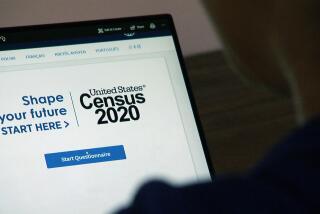Census officials want to change how they count people in 2020, but observers say there isn’t enough money
The next national census is still three years away, but national advocacy groups say the government is running out of time and money to do it right.
Despite sweeping plans to change how citizens are counted in the constitutionally required census, observers say the U.S. Census Bureau won’t be able to fully make the switch if Congress doesn’t act soon to increase the bureau’s budget.
How important is the decennial census? Among other things, the count of the nation’s population is used to draw congressional districts. And in 2010, California nearly lost in Congress because the census found the state’s population didn’t grow as quickly as other states. NALEO Educational Fund, a Latino advocacy group among those raising census funding concerns, estimated last year that thousands of Latino children in the Los Angeles area weren’t counted in the 2010 census.
In 2020, the Census Bureau plans to count people through online and phone surveys, rather than just using mailed surveys or workers knocking on doors. It would be a tectonic shift in the way the government counts the estimated 330 million people in the country.
The Census Bureau hopes using more technology would make the count more accurate and could help shave $5 billion from what was otherwise expected to be a more than $17-billion price tag for the prep work and the census itself.
But to do that, the bureau has to build new systems and test them extensively. The Census Bureau has already canceled a handful of tests of the new methods, including one in Puerto Rico to examine its ability to collect data only in Spanish, citing uncertainty over the census’ budget. A test of collecting data digitally in several Asian languages held in Los Angeles last summer went forward.
In 2018, the Census Bureau is supposed to hold the final, large-scale test that serves as a dress rehearsal for the 2020 census.
“If Congress really wants the bureau to save those $5 billion in 2020, they need to spend the money now to get it right. There’s no do-overs come 2020,” said the NALEO Educational Fund’s executive director, Arturo Vargas, who lives in Los Angeles.
The Census Bureau has scuttled plans to do things differently before: Just before the 2010 census, the bureau dropped plans to collect information door to door on hand-held computers and sent people out with paper forms instead. The abrupt change cost billions.
Congress didn’t pass a budget last year. Instead, it kept most government agency funding at the same amount through what is called a continuing resolution. And it is widely expected to pass another one before the end of this month. The problem is the costs of planning the census are expected to surge soon as the bureau makes final preparations.
“If Congress doesn’t fund the ramp-up now, the bureau may not be in the position where it will have sufficiently tested all of its innovations so it can pull off the 2020 census as it has been planning,” Vargas said.
That concern was echoed by the Government Accountability Office in February, when it added the 2020 census to its list of most at-risk government programs.
“These innovations show promise for a more cost-effective head count,” the February report states. “However, they also introduce new risks, in part, because they include new procedures and technology that have not been used extensively in earlier decennials, if at all.”
The new counting methods, which would include using digital maps to determine if a home is occupied and should be sent a census form rather than sending a person to check, have concerned some Republican members of Congress. Because the count dictates so much, Congress has for years been reluctant to allow changes, and some senators and representatives have questioned whether the bureau can get the technology in place by 2020.
Census Bureau staff said they are keeping an eye out for the president’s full budget, which should be released in mid-May, but said they were heartened his preliminary budget indicated he wanted Congress to appropriate $1.5 billion for the bureau, about $100 million more than it got last last year.
Still, that is about $135 million less than it requested for this fiscal year. In anticipation of the ramp-up before the census, the bureau asked for a 21% increase in funding.
The White House budget office told Politico it considers its proposed increase enough for the Census Bureau to make the upgrades now.
But Congress can and often does craft a budget separate from what the president proposes, so worried advocacy groups have begun sounding the alarm on Capitol Hill.
Los Angeles is keeping a close watch as well, Mayor Eric Garcetti’s spokesman said.
“Everyone who lives in Los Angeles should be counted in the census. The mayor is concerned about any funding cuts that might jeopardize the integrity of the count — especially at a time when some in our communities may feel uneasy about interacting with the federal government,” said spokesman George Kivork.
To read the article in Spanish, click here
Twitter: @sarahdwire
Read more about the 55 members of California’s delegation at latimes.com/politics.
ALSO:
Sen. Kamala Harris sees a path out of the wilderness for Democrats — but can she sell it to them?
Lawmakers aim to move California’s presidential primary right behind Iowa and New Hampshire
Updates on California politics
More to Read
Get the L.A. Times Politics newsletter
Deeply reported insights into legislation, politics and policy from Sacramento, Washington and beyond. In your inbox three times per week.
You may occasionally receive promotional content from the Los Angeles Times.







